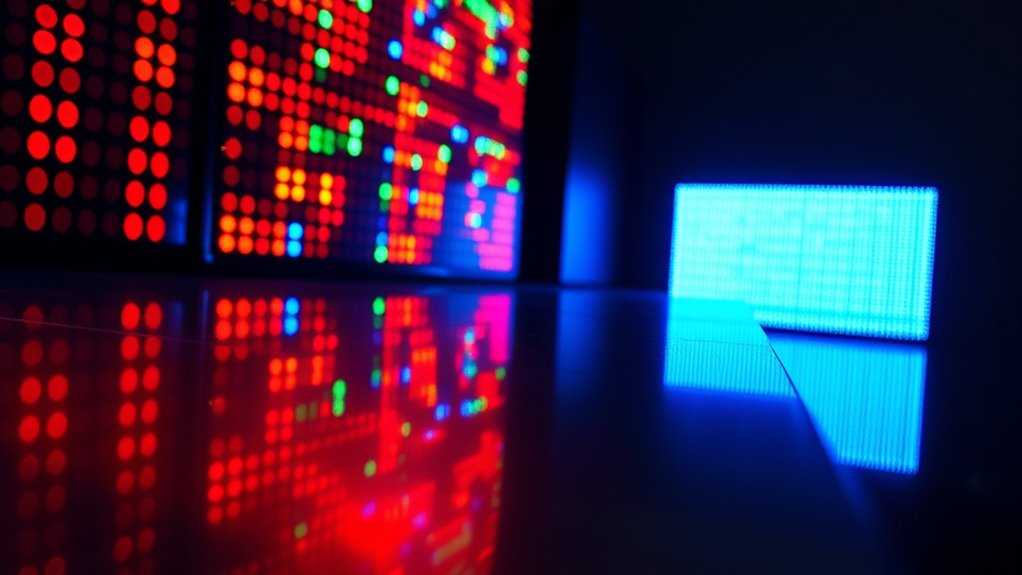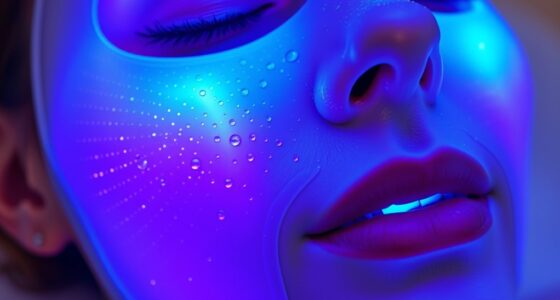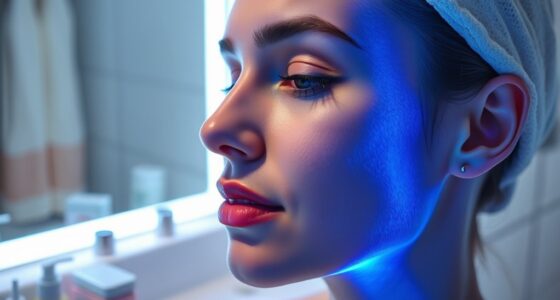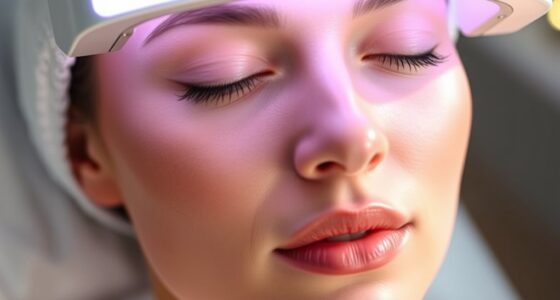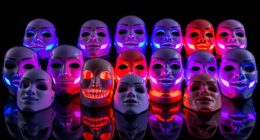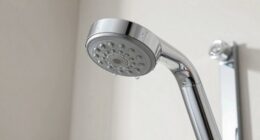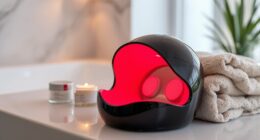Many believe blue light from LEDs and screens causes permanent eye damage, but science shows this isn’t true. While blue light can cause temporary eye strain and disrupt sleep, it doesn’t harm your eyes long-term or cause diseases like macular degeneration. Taking regular breaks, using blue light filters, and managing screen time help reduce discomfort and improve sleep quality. Keep exploring to learn effective ways to protect your vision and rest.
Key Takeaways
- Blue light from LEDs and screens causes only temporary eye discomfort, not permanent damage like macular degeneration.
- Prolonged screen exposure may lead to digital eye strain but does not cause long-term eye harm.
- Blue light can disrupt sleep by suppressing melatonin, but effects vary; filters and managing exposure help.
- Blue light glasses can reduce eye strain but do not eliminate all negative effects; proper habits are essential.
- Managing screen time and using protective measures support eye health without relying solely on blue light blocking devices.
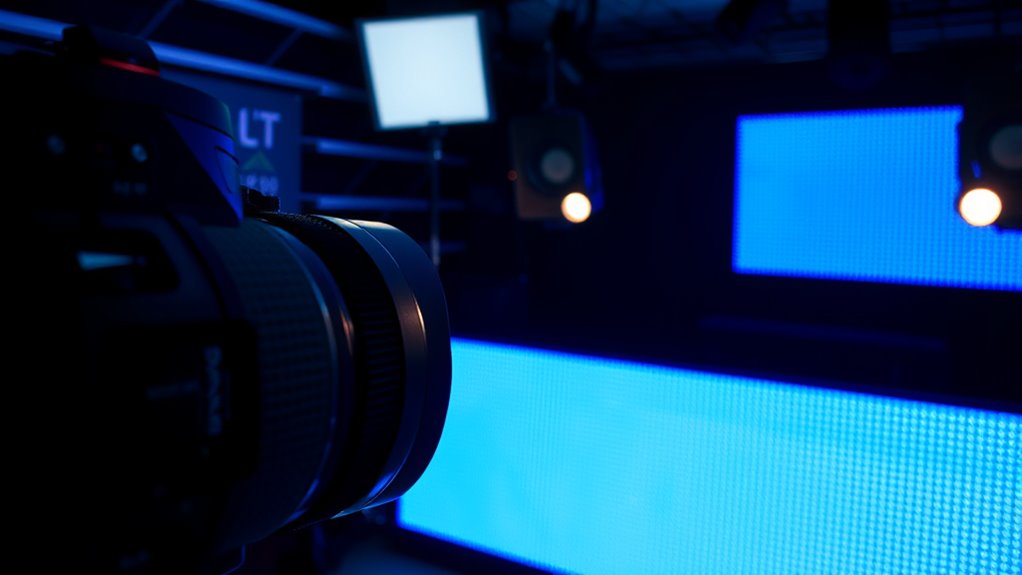
Exposure to LED screens and blue light can have noticeable effects on your eyes and overall well-being. You might have heard that spending hours in front of screens causes eye strain, disrupts sleep, or even leads to long-term eye damage. While some of these concerns are valid, many myths surrounding blue light exposure are exaggerated or misunderstood. It’s important to separate fact from fiction so you can make informed decisions about your screen time.
One common myth is that blue light from screens causes permanent damage to your eyes. While blue light can cause temporary discomfort, such as eye strain and dryness, there’s no solid evidence that it causes irreversible damage like macular degeneration or vision loss. Your eyes are equipped with natural defenses, and normal exposure to blue light—even from screens—is generally safe. The real issue is that prolonged screen time can lead to digital eye strain, which manifests as headaches, blurred vision, or dry eyes. Taking regular breaks using the 20-20-20 rule (looking at something 20 feet away for 20 seconds every 20 minutes) can considerably reduce discomfort.
Another myth is that blue light exposure before bed ruins your sleep entirely. While blue light can interfere with your circadian rhythm by suppressing melatonin production, it doesn’t completely block sleep. Using screens an hour before bed might make it harder to fall asleep or reduce sleep quality, but this effect varies among individuals. The best approach is to limit screen time close to bedtime or use settings that reduce blue light emissions, such as “night mode” or blue light filters, which can help your body wind down more naturally.
Some people believe that wearing special blue light glasses will eliminate all the negative effects of screen exposure. These glasses do block some blue light, but scientific evidence on their effectiveness is mixed. They might help reduce eye strain for some users, especially during extended screen use, but they aren’t a cure-all. The most practical steps remain adjusting your screen brightness, maintaining proper distance, and taking frequent breaks. Additionally, understanding the science behind blue light can help you make better choices about managing your exposure.
Frequently Asked Questions
Can Blue Screen Exposure Cause Permanent Vision Damage?
Blue screen exposure typically doesn’t cause permanent vision damage. Your eyes are designed to handle brief exposure to bright screens and blue light. However, prolonged or intense exposure might lead to eye strain, discomfort, or temporary vision issues like dryness or blurred vision. To protect your eyes, take regular breaks and consider using blue light filters. If you experience persistent problems, consult an eye care professional for personalized advice.
Are LED Screens Safer Than Traditional Screens for Eye Health?
LED screens are generally safer for your eyes than traditional screens, especially since they emit less blue light—the primary culprit behind eye strain. Studies show that prolonged exposure to blue light can increase discomfort and disrupt sleep cycles, but LED screens often have built-in settings to reduce blue light emission. So, if you use screens wisely and take breaks, you’ll minimize eye strain and protect your vision effectively.
How Long Does It Take for Blue Light to Affect Sleep Patterns?
Blue light can start affecting your sleep patterns within about 30 minutes to an hour of exposure, especially if you’re using screens before bed. It suppresses melatonin production, making it harder for you to fall asleep and reducing sleep quality. To minimize this, consider using blue light filters or limiting screen time in the evening. Being mindful of your exposure helps protect your sleep health and overall well-being.
Do All LED Devices Emit Harmful Levels of Blue Light?
Not all LED devices emit harmful levels of blue light. Modern LEDs are designed with safety in mind, often incorporating blue light filters to reduce exposure. However, some devices, especially older or cheaper models, may emit higher blue light levels. You should check the specifications or use blue light filtering tools or glasses if you’re concerned about potential eye strain or sleep disruption. Being aware helps you make safer choices.
Is There a Safe Duration for Exposure to Blue Screens Daily?
Yes, there’s a safe, sensible screen-surfing span. Experts suggest limiting blue screen exposure to about two hours daily to prevent eye strain and sleep disruption. You should take frequent breaks—every 20 minutes—and follow the 20-20-20 rule: look at something 20 feet away for 20 seconds. Adjust your device settings to reduce blue light emissions, especially before bedtime, to optimize ocular health and overall well-being.
Conclusion
While many believe LED and blue screen exposure is harmless, the truth is different. It’s easy to dismiss the risks as mere myths, but ignoring them can lead to serious health issues. Don’t let the allure of vibrant screens blind you to the potential damage. Awareness and caution can protect your well-being. Remember, what seems harmless today might affect your future tomorrow—choose to prioritize your health over fleeting screen time.
